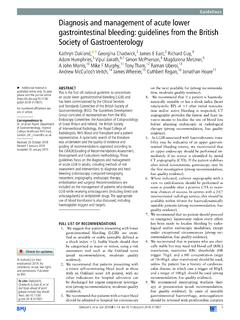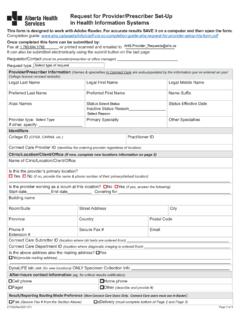Transcription of Endoscopy in patients on antiplatelet or anticoagulant ...
1 1611 Veitch AM, et al. Gut 2021;70:1611 1628. in patients on antiplatelet or anticoagulant therapy: British Society of Gastroenterology (BSG) and European Society of Gastrointestinal Endoscopy (ESGE) guideline updateAndrew M Veitch ,1 Franco Radaelli ,2 Raza Alikhan,3 Jean Marc Dumonceau,4 Diane Eaton,5 Jo Jerrome,6 Will Lester,7 David Nylander,8 Mo Thoufeeq,9 Geoffroy Vanbiervliet,10 James R Wilkinson,11 Jeanin E Van Hooft12To cite: Veitch AM, Radaelli F, Alikhan R, et al. Gut 2021;70:1611 1628. Additional supplemental material is published online only. To view, please visit the journal online (http:// dx. doi. org/ 10. 1136/ gutjnl- 2021- 325184).For numbered affiliations see end of toDr Andrew M Veitch, Gastroenterology, Royal Wolverhampton Hospitals NHS Trust, Wolverhampton, UK; Andrew. veitch@ nhs. netThis article is published simultaneously in the journals Endoscopy and Gut. Copyright 2021 European Society of Gastrointestinal Endoscopy , all rights reserved and by BMJ Publishing Group Ltd.
2 This article is published by Thieme Georg Verlag KG, R diger Stra e 14, 70469 Stuttgart, 16 May 2021 Accepted 20 June 2021 2021 European Society of Gastrointestinal Endoscopy , British Society of Gastroenterology, the Author(s) or their employer(s)AbsTrACTThis is a collaboration between the British Society of Gastroenterology (BSG) and the European Society of Gastrointestinal Endoscopy (ESGE), and is a scheduled update of their 2016 guideline on Endoscopy in patients on antiplatelet or anticoagulant therapy. The guideline development committee included representatives from the British Society of Haematology, the British Cardiovascular Intervention Society, and two patient representatives from the charities Anticoagulation UK and Thrombosis UK, as well as gastroenterologists. The process conformed to AGREE II principles and the quality of evidence and strength of recommendations were derived using GRADE methodology. Prior to submission for publication, consultation was made with all member societies of ESGE, including BSG.
3 Evidence- based revisions have been made to the risk categories for endoscopic procedures, and to the categories for risks of thrombosis. In particular a more detailed risk analysis for atrial fibrillation has been employed, and the recommendations for direct oral anticoagulants have been strengthened in light of trial data published since the previous version. A section has been added on the management of patients presenting with acute GI haemorrhage. Important patient considerations are highlighted. Recommendations are based on the risk balance between thrombosis and haemorrhage in given of reCommendATionsRecommendations for the management of patients on antiplatelet therapy or anticoagulants undergoing elective endoscopic procedures are summarised in figures 1 and 2. Risk stratification for endoscopic procedures are detailed in table 1, for antiplatelet agents in table 2, and for heparin bridging in patients on warfarin table recommend that all patients are advised of the thrombotic risks of discontinuing antiplatelets or anticoagulants, as well as the haemorrhagic risks of continuing therapy (strong recommendation, low quality evidence).
4 For all endoscopic procedures we recommend continuing aspirin (strong recommendation, low quality evidence), with the exception of ampullec-tomy (weak recommendation, low quality evidence). If considering aspirin discontinuation, this should be on an individual patient basis depending on the risks of thrombosis versus haemorrhage (weak recommendation, low quality evidence).Low-risk endoscopic proceduresFor low- risk endoscopic procedures we recommend continuing P2Y12 receptor antagonists as single or dual antiplatelet therapy (DAPT) (strong recom-mendation, low quality evidence).For low- risk endoscopic procedures we suggest that warfarin therapy should be continued (weak recommendation, low quality evidence). It should be ensured that the international normalised ratio (INR) does not exceed the therapeutic range in the week prior to the procedure (strong recommenda-tion, low quality evidence).
5 For low- risk endoscopic procedures we suggest omitting the morning dose of direct oral anticoag-ulants (DOACs) on the day of the procedure (weak recommendation, low quality evidence).High-risk endoscopic proceduresFor high- risk endoscopic procedures in patients at low thrombotic risk, we recommend discontinuing P2Y12 receptor antagonists 7 days before the proce-dure (strong recommendation, moderate quality evidence). In patients on DAPT, we recommend continuing aspirin (strong recommendation, low quality evidence).For high- risk endoscopic procedures in patients at low thrombotic risk, we recommend discon-tinuing warfarin for 5 days before the procedure (strong recommendation, high quality evidence). Check INR prior to the procedure to ensure < (strong recommendation, low quality evidence).For high- risk endoscopic procedures in patients at high thrombotic risk, we recommend continuing aspirin and liaising with a consultant interventional cardiologist about the risk/benefit of discontinuing P2Y12 receptor antagonists (strong recommenda-tion, high quality evidence).
6 For high- risk endoscopic procedures in patients at high thrombotic risk, we recommend that warfarin should be temporarily discontinued and substi-tuted with low molecular weight heparin (LMWH) (strong recommendation, low quality evidence). on August 6, 2021 by guest. Protected by : first published as on 6 August 2021. Downloaded from 1612 Veitch AM, et al. Gut 2021;70:1611 1628. 1 Guidelines for the management of patients on P2Y12 receptor antagonist antiplatelet agents undergoing endoscopic procedures: 2021 update. EMR, endoscopic mucosal resection; ERCP, endoscopic retrograde cholangiopancreatography; ESD, endoscopic submucosal dissection;EUS, endoscopic ultrasound; PEG, percutaneous endoscopic high- risk endoscopic procedures in patients on DOACs, we recommend that the last dose of DOACs be taken 3 days before the procedure (strong recommendation, low quality evidence). For patients on dabigatran with a creatinine clearance (CrCl) (or estimated glomerular filtration rate (eGFR)) of 30 50 mL/min we recommend that the last dose be taken 5 days prior to the procedure (strong recommendation, low quality evidence).
7 In any patient with rapidly deteriorating renal function a haematol-ogist should be consulted (strong recommendation, low quality evidence).Post elective endoscopic proceduresIf antiplatelet or anticoagulant therapy is discontinued, then we recommend this should be resumed up to 2 3 days after the procedure depending on the perceived haemorrhagic and throm-botic risks (strong recommendation, moderate quality evidence).For all patients on antiplatelets or anticoagulants we recom-mend advising that there is an increased risk of post- procedure haemorrhage compared with patients not on these drugs (strong recommendation, low quality evidence).Acute Gi haemorrhageWe suggest that permanent discontinuation of aspirin for primary prophylaxis should be considered (weak recommendation, low quality evidence).We suggest that aspirin for secondary prevention should not be routinely stopped. If it is stopped, it should be recom-menced as soon as haemostasis is achieved, or there is no further evidence of haemorrhage (strong recommendation, moderate quality evidence).
8 We recommend that DAPT is continued if possible in patients with coronary stents in situ and management should be in liaison with a consultant interventional cardiologist (strong recommen-dation, moderate quality evidence). In the case of major haem-orrhage we recommend continuing aspirin if the P2Y12 receptor antagonist is interrupted (strong recommendation, moderate on August 6, 2021 by guest. Protected by : first published as on 6 August 2021. Downloaded from 1613 Veitch AM, et al. Gut 2021;70:1611 1628. 2 Guidelines for the management of patients on anticoagulants undergoing endoscopic procedures: 2021 update. *Blood pressure >140/90 mm Hg or on antihypertensive medication. **Previous VTE on anticoagulation and target INR now **Depends on haemorrhagic and thrombotic risk, consider extending interval for ESD. AF, atrial fibrillation; EMR, endoscopic mucosal resection; ERCP, endoscopic retrograde cholangiopancreatography; ESD, endoscopic submucosal dissection; EUS, endoscopic ultrasound; INR, international normalised ratio; LMWH, low molecular weight heparin; PEG, percutaneous endoscopic gastroenterostomy; TIA, transient ischaemic attack.)
9 VTE, venous 1 Risk stratification of endoscopic procedures based on the risks of haemorrhage and of intervention required to treat a complicationHigh- risk proceduresLow- risk proceduresEndoscopic polypectomy*Diagnostic procedures biopsy samplingERCP with sphincterotomyBiliary or pancreatic stentingAmpullectomyDevice- assisted enteroscopy without polypectomyEndoscopic mucosal resection or endoscopic submucosal dissectionOesophageal, enteral or colonic stentingEndoscopic dilatation of strictures in the upper or lower GI tractEndoscopic ultrasound without sampling or interventional therapyEndoscopic therapy of varices Percutaneous endoscopic gastrostomy Endoscopic ultrasound- guided sampling or with interventional therapy Oesophageal or gastric radiofrequency ablation *Consider cold snare resection of polyps <1 cm on continued clopidogrel , endoscopic retrograde evidence). P2Y12 receptor antagonist therapy should be re- instated within 5 days, if still indicated (strong recommenda-tion, moderate quality evidence).
10 We recommend withholding oral anticoagulant and correcting coagulopathy according to the severity of haemorrhage and the patient s thrombotic risk in coordination with a consultant cardi-ologist/haematologist. The correction of coagulopathy should not delay Endoscopy or radiological intervention (strong recom-mendation, low quality evidence).In patients with haemodynamic instability who take vitamin K antagonists (VKAs), we recommend administering intravenous vitamin K and four- factor prothrombin complex concentrate (PCC) (strong recommendation, low quality evidence), or fresh frozen plasma if PCC is not available (weak recommendation, very low quality evidence).In patients with haemodynamic instability who take DOACs, we suggest considering the use of reversal agents: idarucizumab in dabigatran treated patients , and andexanet in anti- factor- Xa (anti- FXa) treated patients (weak recommendation, low quality evidence), or intravenous four- factor PCC if andexanet is not available (weak recommendation, very low quality evidence).












